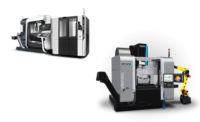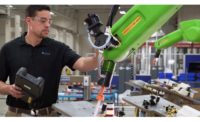INDUSTRY HEADLINE
Safety, Labor And Connectivity Drive Innovation At IMTS 2018 Machine Components/Cleaning/Environmental Pavilion

CHICAGO — Smooth and safe operations can make all the difference in keeping a company profitable and competitive in a tight manufacturing market.
The latest equipment and technology for maintaining operations at maximum productivity will be featured at IMTS 2018 – The International Manufacturing Technology Show – which runs from Sept. 10 to 15 at Chicago’s McCormick Place – in the Machine Components/Cleaning/Environmental Pavilion, located on Level 2 of the East Building.
Industry trends such as more stringent safety regulations, faster operation speeds, labor shortages and improved customer experiences have a big impact on auxiliary equipment design.
“Exhibitors at the Machine Components/Cleaning/Environmental Pavilion will introduce the newest solutions to run an efficient plant, from maintenance to monitoring and cleaning for safe and environmentally responsible operations,” says Peter R. Eelman, vice president of exhibitions and business development, The Association for Manufacturing Technology, which owns and produces IMTS.
Keep it Safe
Operator safety remains a top priority for many manufacturers, which often requires taking extra measures and adopting new technologies to be compliant. The Machine Components/Cleaning/ Environmental Pavilion will feature new solutions for machine guarding, enclosures, platforms, ergonomic hand tools with grips to suit a variety of hand sizes, noise-reducing compressed air nozzles and sensors to react quickly to human interference.
“Higher safety standards originating with OSHA and within company’s own internal policies have increased the need for more operator protective measures,” says Noah Goellner, vice president of global business operations at Hennig, Inc. (booth 121207), a manufacturer of facility safety, machine protection and byproduct removal systems for machine shops.
“Safety standards are always on the rise, especially in the United States, which is adopting tougher safety requirements,” Goellner says. “It requires us to constantly monitor regulatory changes so we are providing equipment that keeps people safe and customers in compliance.”
Faster equipment and operating speeds require better machine safety for operators but also need to be adjustable for lighter materials. For example, heavier steels once used in chip conveyors or bellow covers are now made of aluminum but still need to have the same durability for impact and wear.
Protect Capital Investments
As capital equipment becomes more expensive, companies are willing to invest in more technology to protect it against damage. For example, Goellner has seen the increasing demand for walk-on pit covers that are durable enough to cover openings of large machinery, protecting equipment below from impact or harsh chemicals and keeping operators safe.
“Companies need to prolong the operation of their equipment to get the most from their investments,” Goellner says. “Machine protection is built into the system design line to ensure the lowest total cost of ownership possible over the life of the machines.”
Hennig will introduce new walk-on covers ideal for applications that require sturdy, load bearing covers. Available in retractable/roll-up and fixed designs, the covers are ideal for chemical tanks to contain fumes and prevent injury; large machine tools with exposed ways and pits; and machine enclosures with large openings in the walls or floor.
Simplify Operation
The shortage of skilled labor creates a challenge for manufacturers. Exhibitors at the Machine Components/Cleaning/Environmental Pavilion will have solutions to make equipment more automated and easier to use. These solutions include simpler interfaces such as intuitive touchscreens, quick-response (QR) codes that bring up instructional information with a single smartphone click, user-friendly ordering and quote request forms. Machines that are simpler to operate will allow manufacturers to cross-train employees on multiple jobs so they can make the best use of the available workforce to meet customer demands at any given time.
Safe and Efficient Maneuvering
At IMTS 2018, exhibitors will launch their most advanced automation technology, such as faster and stronger autonomous mobile robots and remote-controlled transfer carts that carry extra heavy loads. New at the show from Mobile Industrial Robots (booth #121468). The robot safely maneuvers around people and physical obstacles using advanced technology and sophisticated software to autonomously navigate the most efficient path to its destination. Equipped with the latest laser-scanning technology, the robot delivers a 360-degree visual for optimal safety. 3D cameras have a range of 30 to 2,000 mm above floor level to detect pallets.
Customer Experience
New trends in the industry go beyond the equipment itself, and include new ways to communicate and interact with customers. Today’s customers demand faster turnaround for service issues and have a lower tolerance for equipment downtime.
“Customer experience is a very important factor to being competitive today,” says Natasha Hardin, marketing manager at Hennig. “Service teams need to be ready to react quickly, but manufacturers also design equipment so customers can troubleshoot their own problems whenever possible. Either way, the goal is to keep maintenance downtime to a minimum.”
Goellner expects to see augmented reality playing a big part in maintenance and diagnostics in the future.
“Technology like virtual reality smart glasses will become an important tool in maintenance,” he says. “From an office, service personnel will be able to see what the customer is looking at and make recommendations immediately after a problem starts. For onsite technicians, the glasses will provide an overlayed visual of a product and pop-up instructions on how to make repairs.”
Job Shop Software
The Machine Components/Cleaning/Environmental Pavilion also hosts software providers, including those that focus on machine shops, sheet metal fabricators, stampers, spring and wire form shops. New Cloud-based solutions eliminate the need to upgrade hardware and provide functionality to:
Quote parts (either custom or repetitive) using cost-plus estimating with the ability to copy information previous estimates, work orders, or repetitive parts or to work up estimates from scratch
Convert quotes seamlessly to sales orders without needing to re-key data
Release work orders to the shop floor driven either from direct sales order demand or min/max levels of stock inventory
Schedule work at a resource group and resource level to optimize throughput
Purchase direct to the work order or to replenish stock
Ship and invoice
Smart Factories
IMTS 2018 will include more Industrial Internet of Things (IIoT) and artificial intelligence (AI) to identify problems and avoid breakdowns. Smart machines can facilitate predictive maintenance by noticing part wear, recommending a replacement time and ordering a new part for delivery. Specially designed ERP solutions have capabilities designed specifically for machine shops. At IMTS 2018, Goellner plans to investigate how artificial intelligence may be used to help his customers in the factories of the future.
“Today’s computing power makes data analytics so fast, so users can gain insights and analyze the results rapidly,” says AMT’s Eelman. “AI will give users the ability to learn from that data so machines can fix problems on their own. IMTS gives visitors the opportunity to see these trends so they can be prepared to update their equipment to meet productivity demands.”
For more information, visit imts.com.
Looking for a reprint of this article?
From high-res PDFs to custom plaques, order your copy today!





